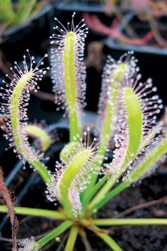Hollywood has degraded the fascinating Venus flytrap, turning it into a silly monster. Consider the bloodsucking Audrey II in the macabre 1986 musical Little Shop of Horrors. Or Cleopatra, the prey-strangling pet of Addams Family matriarch Morticia.

But the Leicester-based Josh Lynch speaks of the plant tenderly, as one would about a child—and a misunderstood one at that. Surprisingly, the exotic flytrap is native only to a 100-square-mile area surrounding Wilmington, N.C. “I meet people across the board who don’t know that,” Lynch noted during an early-March interview with Xpress.
His greenhouse isn’t big, but perched on a hill, it seems larger than his small home. Both structures sit in a peaceful, treeless corner of Buncombe County. Outside, snow is still melting on distant peaks; inside the nursery, the air is 85 degrees and ponderous with moist life. A used hot-water heater, scavenged from Lynch’s volunteer gig at Habitat for Humanity, feeds a series of garden hoses positioned beneath the rows of young cuttings. Lynch designed and built the cleverly constructed radiant floor-heating system himself.
His 5-year-old business, The Carnivorous Plant Connection, specializes in potted Venus flytraps, sundews and pitcher plants, all insect eaters and most of them indigenous to the Southeast. Despite the flytrap’s notoriety, the tall, elegant pitcher plants—including varieties that grow wild in Western North Carolina—are his best-sellers, says Lynch, who wholesales his plants to local outlets and hawks them at the Asheville City Market and regional festivals. “People mostly buy the pitchers as ornamentals,” he reports, “not necessarily to catch bugs.”
For Lynch, however, his plants’ utility is part of their beauty. “I’ve always been interested in insects and their role in the ecosystem,” he explains. Botanical processes are omnipresent even when unseen. But with carnivorous plants, the life cycle is on full display.
“It’s more active,” says Lynch. “In watching the plant trap and consume insects, you see it absorbing its nutrients through its leaves.” The pitcher plants, he notes, “act as a pitfall”—meaning the bugs tumble down the tube-shaped leaves, which are too smooth and steep for them to crawl back out. The delicately tentacled sundew, sparkling with an acidic, gluey substance, “is like living flypaper,” he continues. And the lobe-leafed flytrap, of course, “snaps shut.”
Sundews and pitchers secrete nectar to lure their prey, and Lynch seems particularly pleased with the latter plant’s MO. “The leaves actually lay down, and ants crawl on them like a bridge over water. They follow the trail of nectar up to the mouth and fall in,” he says.
Wily though they may be, carnivorous plants are no match for the encroaching development that threatens their habitat—golf courses are a top perp. The plants hew naturally to swampy spots, notes Lynch, and while bogs are chiefly associated with coastal climates, “There used to be many thousands of acres of them in this area too. Now, because of development and changing hydrology, there are less than 1,000 acres of mountain bogs. Many bog animals and plants are threatened—not just the pitchers.”
Happily, however, cultivating carnivorous plants is not all that difficult, the horticulturist reports. “There’s the misconception that [carnivorous plants] are hard to maintain: They’re not. In containers, they’re cold-hardy to 20 degrees, and in the ground, to 0 degrees.” Indoors, they like infrequent watering and a sunny windowsill, where they offer an added benefit. “Sundews are great for catching little flying bugs inside the house,” notes Lynch.
Just don’t overfeed them, he cautions. Carnivorous plants eat bugs for nutrition, not for kicks, so any additional sustenance can be harmful. Lynch says he often hears back from his customers, most of whom find that a hands-off approach works best with these hungry beings. “Unless someone goes and puts fertilizer on them, the plants always do well. I rarely hear that one has kicked the bucket.”
Lynch will be at the Grove Arcade’s “Downtown in Bloom” festival Saturday and Sunday, April 25 and 26, and at the Asheville City Market (in the parking lot of the Public Works Building, 161 S. Charlotte St.) Saturdays from May through August. His plants are also available through various local retailers. For more information, go to www.cp-connection.com or e-mail joshlynch@gmail.com.
[Melanie McGee Bianchi is a stay-at-home mom and freelance journalist.]



Before you comment
The comments section is here to provide a platform for civil dialogue on the issues we face together as a local community. Xpress is committed to offering this platform for all voices, but when the tone of the discussion gets nasty or strays off topic, we believe many people choose not to participate. Xpress editors are determined to moderate comments to ensure a constructive interchange is maintained. All comments judged not to be in keeping with the spirit of civil discourse will be removed and repeat violators will be banned. See here for our terms of service. Thank you for being part of this effort to promote respectful discussion.